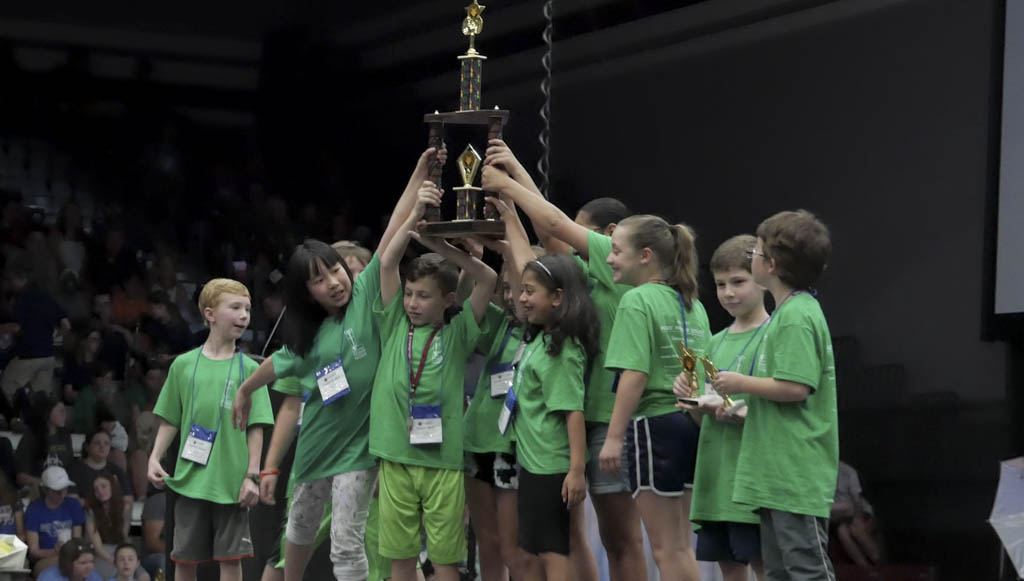MILLSTONE – While they help to combat the growth of an invasive plant species in their community, a group of elementary school pupils from Millstone Township earned top honors at an international competition.
The 19 pupils in grades three through five at the Millstone Township Elementary School who call themselves the Phearless Phragmites Phighters were awarded first place in the Future Problem Solvers International Conference’s Junior Team Division for Environmental Concerns.
The Phearless Phragmites Phighters are Ethan Bailey, Ryan Bailey, Tia Bajaj, Rafferty Burden, Anna DePinho, Brendan DeRose, Mahi Desai, Charlie Duffy, Rachel Glantzberg, Evangeline Huey, Gianna Iannaccone, Prisha Kupsad, Thomas Maltese, Gabriella Menar-Nohilly, Gavin Normand, Jai Patel, Dylan Quinn, Francesca Scibilia and Joshua Sullivan.
Teachers Beth Topinka and Jennifer Modula are the pupils’ advisers.
The Future Problem Solvers International Conference took place in La Crosse, Wisc., from June 7-11. The Millstone pupils earned an invitation to the international competition by placing first in the Junior Team Community Problem Solving Division at the New Jersey Problem Solving Program State Bowl in March.
According to Topinka, the Future Problem Solvers International Conference draws teams from Australia, Canada, Hong Kong, Japan, Korea, Malaysia, Portugal, New Zealand, Russia, Singapore, Great Britain, Turkey and India.
As part of a project for their Community Problem Solvers Club, the Millstone pupils were tasked with determining an area of concern that affects their community, researching the problem and developing a plan of action to address the problem and help the township.
The area of concern as determined by the pupils was the presence of Phragmites australis in their community.
Phragmites australis, according to Topinka, can reach 18 feet in height. The plant grows in thick patches with dense root systems that spread and push out native plants and animals.
The plant is difficult to remove once it has become established in an area. It harms diversity in ecosystems, does not provide a food source for native animals, interferes with marsh food webs, affects the supply of water needed by plants and animals, and produces seed tops that can bother individuals with grass allergies, according to Topinka.
The pupils identified locations in Millstone Township where Phragmites australis is growing. They were subsequently recognized by the Township Committee and the Environmental Commission for their work.
At the international competition, the Phearless Phragmites Phighters were scored on their timed assembly of a tabletop display, with no adult assistance permitted, according to a press release from Topinka.
The display included a moving drone model, Phragmites density model, rhizome model, three scrapbooks documenting the team’s research, action and outcomes, a project video, a drone aerial survey video, geographic information system maps, and an interactive Invase-Away demonstration.
The team was also scored on its performance in a half-hour interview conducted by international conference evaluators.
According to the press release, Community Problem Solving Division teams presented their work at a fair following the competitive events during which the pupils explained their project to guests and had the opportunity to visit displays presented by the other teams from around the world.
In addition to the competition, the pupils’ time in Wisconsin saw them take a private tour of the U.S. Geological Survey’s Upper Midwest Environmental Sciences Center, according to the press release.
Prior to the competition, the pupils attended the World Science Festival 2017 in New York City on June 4, where they provided a presentation about their project.
“We are so proud of our young team, placing first in their division,” Topinka said. “The international conference and the World Science Festival were incredible experiences and I’m bursting with pride for my team.”

